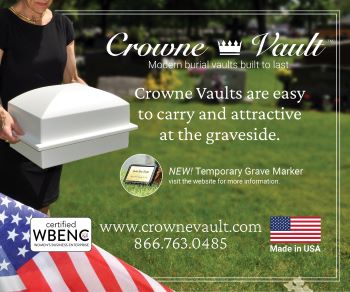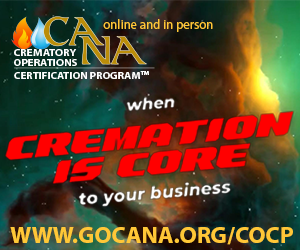Green up your cremations by recycling
 There’s a lot of talk in our industry today about the disposition movements such as recomposition (human composting), alkaline hydrolysis (water cremation), and green burials. All of those fairly new ideas for human dispositions argue that they are more environmentally friendly than casketed earth burial and cremation.
There’s a lot of talk in our industry today about the disposition movements such as recomposition (human composting), alkaline hydrolysis (water cremation), and green burials. All of those fairly new ideas for human dispositions argue that they are more environmentally friendly than casketed earth burial and cremation.
While that is more than likely true. . . .and we can see modest growth over time in those processes as choices of the consumer, it is our prognosis at Funeral Director Daily that good, old fashioned flame cremation will be the leading method of human disposition for probably the next two decades at least.
Again, in our opinion, probably the only thing that could stop that prediction from coming true would be a consumer revolt against real or perceived environmental problems with flame cremation. And, if that is true, funeral homes and crematories should be doing everything they can do to make cremation as environmentally sound as possible.
That would include technology advances by the crematory companies to make sure that the expelled air is as clean as possible and it should include each crematory making sure that they recycle post-cremation metal.
I installed a crematory in our new funeral facility in 2006. Even after a 25 year career as a funeral home owner/operator I was so naive that I had not even thought about what to do with the post-cremation metal. I had no idea that there were people in our industry who would help you rid your funeral home of it and in the process “green up” your cremation procedures.
Here is an article, that I learned much from, authored by Melissa Polis on the values of post-cremation metal recycling. Funeral Director Daily is printing it with Ms. Polis knowledge and authorization.
How Post-Cremation Metal Recycling Helps Mother Earth
By Melissa Polis
Starting a post-cremation metal recycling program comes with tons of benefits, including clearing out space at your crematory. But perhaps the most significant benefit of post-cremation metal recycling is how it helps the environment.
Environmental concerns are on everyone’s mind today, and it’s an increasingly prevalent topic in the death care industry. Many people are becoming interested in green or natural burials, alkaline hydrolysis, and fair-trade cut flower vendors for services. For funeral homes and crematories, another way to “go green” is to recycle post-cremation metals.
Post-cremation metals run the gamut from orthopedic implants to dental materials, and some of these metals can be damaging to the environment when buried in cemetery grounds or taken to local scrapyards. Not only that, but when these metals are recycled, crematories are helping to conserve natural resources by lessening the need for mining operations for new metals.
Preventing silver pollution
Post-cremation metals often include dental metals such as gold, silver, platinum, and palladium. These dental metals are highly valuable and, when they’re recycled with a premier post-cremation metal recycler, they can yield substantial returns to funeral homes and crematories.
But the extra income is not the only reason crematories should recycle dental metals and other post-cremation metals. Some dental metals, such as silver, can be toxic to the environment, even in trace amounts.
Some silver used in dental restorations today comes in the form of silver nanoparticles. While great for dental restorations, scientists are becoming concerned that silver nanoparticles can be harmful to aquatic life when they end up in groundwater. When post-cremation dental metals are buried or taken to landfills, materials like silver nanoparticles can seep into groundwater and streams and harm aquatic life.
Research has shown that silver nanoparticles hurt fish in several ways, including the accumulation of silver in aquatic diets. Phytoplankton form the base level of aquatic diets, and the plankton absorb silver nanoparticles. As fish eat the plankton, the silver gathers in their systems and hurts embryonic fish, leading to spinal cord deformities and cardiac arrhythmia.
Conserving natural resources
Post-cremation metal recycling prevents harm to the environment by reducing pollution. But recycling post-cremation metals also means just that: recycling and conserving the earth’s natural resources.
One easy way to think about this is the recycling of gold from post-cremation metals. When crematories send post-cremation metals to recyclers, the metals are refined, processed, and sent back into the market. Recycled gold can be used for other applications, such as in dentistry, electronics, and jewelry. The world’s total gold supply, on average, from 1995 to 2014 was comprised of about one-third of recycled gold, according to a recent report by Boston Consulting Group.
Recycling post-cremation metals that contain gold, silver, platinum, and palladium is vital because mining operations for these natural resources can be very detrimental to the environment. Processing the ore to produce precious metals like gold requires miners to generate huge amounts of additional waste. According to an estimate by Earthworks, the manufacture of one gold ring generates more than 20 tons of additional waste.
Adding another sustainable practice
Post-cremation metal recycling benefits are numerous, but the most significant benefit may be pitching in to help Mother Earth. As post-cremation metal recycling has become more common, funeral homes and crematories that divert metals from landfills are helping the environment in more ways than they may know.
If you don’t recycle post-cremation metals already, consider doing so as a way to add another sustainable practice to your business. Using post-cremation metal recycling to clear out space at your crematory is excellent, but recycling’s positive net effect on the environment is worth its weight in gold.
From Funeral Director Daily: You can learn more about post-cremation metal recycling here.
More news from the world of Death Care:
- The return of the roll-up. Crain’s Chicago Business. (IL) Editor’s note: This is an excellent article on the “art of the roll up”. i.e. building a business by purchasing similar businesses to gain an economy of scale. The funeral business, among other businesses, is discussed in the article.
- Vandalism at Hollywood Cemetery causes $200k worth of damages, Richmond police chief says. Video story and print article. WWBT TV (VA)
- The business of death is expensive and booming. Spectrum News 1 (NC)
- “It was brutal”: How the pandemic impacted funeral homes and the way Puebloans say goodbye. The Pueblo Chieftain (CO)
Enter your e-mail below t0 join the 1,920 others who receive Funeral Director Daily articles daily:



















